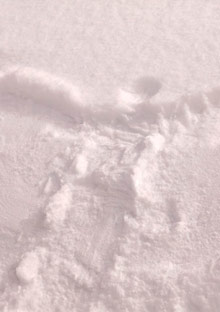Snow Angels

Photo: Peter Rad
Elizabeth Strout and the soldier were from different worlds, yet they shared a haunting insight.
It was January, and I was driving from Portland, Maine, up to Bangor, where I was to speak the next day. The Maine light, so magnificent at that time of year, sliced through the thin-trunked pine trees as I drove up the highway. "What a beautiful world," I thought. "Stark, pristine—God, what a beautiful world." At the hotel (I was staying out near the airport), I was surprised to find the place filled—and I mean the lobby, the hallways, the restaurant—with men and women GIs dressed in fatigues. They seemed so young. They reminded me of the students I had taught for years at Manhattan Community College. These "kids" were on their way to Baghdad. Their plane had encountered a mechanical problem, and no one was sure when the flight would take off. So they were waiting. All around me young people were playing cards, laughing, eating popcorn, and drinking sodas. "They're going to Baghdad," I thought. "Their lives will be changed forever."
That evening it began to snow. I watched through the window of the restaurant as the snow swirled to the ground. And then I saw that a number of the GIs had tumbled outdoors and were playing, lying on their backs, moving their arms, making angels in the snow. I went outside to watch them.
One fellow stood apart from the rest. He was talking on a cell phone, then flipped it shut. He shook a cigarette from a pack. "Do you have a light?" he asked. I saw that he was not as young as the rest. "One second," I told him, and got some matches from someone nearby. As the man lit his cigarette, he said, "I've been there before. Baghdad. Most of these guys haven't. That was my wife on the phone."
"I'm sorry," I said.
He nodded, blew smoke into the cold air. We stood together. Not far off, angels were still being made in the snow. "They don't know," he said, nodding in their direction.
"No," I said. "I mean, I don't know, either. I'm sorry," I said again.
He glanced at me, and it was a look that was a fleeting moment of—of what? A common understanding of something that neither of us could have put into words? I'll never know. I only know that I stood with him while he smoked, and it felt as though we had known each other a long time. Then he tossed his cigarette butt into the snow.
"Take care," I said. I put my fist to my mouth and kissed it—then extended it slightly toward him.
He held the door open for me, shook the snow from his boots. "Thank you," he said. "You, too."
In the morning they were gone. The silence was large. Awful.
Read another chance encounter...



